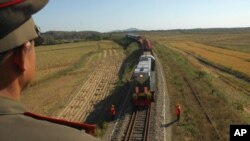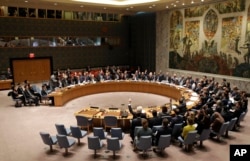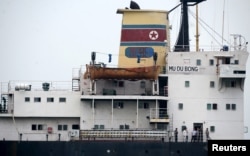South Korea imposed new unilateral sanctions against North Korea on Tuesday as Seoul’s spy agency blames Pyongyang hackers for recent cyber attacks.
These latest developments could further fuel heightened tensions on the Korean peninsula triggered by North Korea’s recent nuclear test and long-range rocket launch.
Closing Russian loophole
The new South Korean measures will add to the recently adopted United Nations Security Council resolution that imposed tough new international sanctions on North Korea.
In a move that may frustrate Russia, South Korea will halt the trilateral “Rajin-Hassan Project” to develop a train system to transport Russian Siberian coal to North Korea’s port in Hassan and then to South Korea by ship.
Before agreeing to support the U.N. sanctions, Russia leveraged its veto power as a member of the Security Council to ensure the resolution would not block exports of Siberian coal to North Korea.
South Korean President Park Geun-hye and Russian leader Vladimir Putin signed an agreement in 2013 to cooperate on the project.
Russia reportedly expressed regret at Seoul's decision.
South Korean Foreign Ministry spokesman Cho June-hyuck said the decision to end Seoul’s participation in the project was made in close consultation with Moscow.
“Between South Korea and Russia, the heads of the two countries have established trust, and have maintained diplomatic communications,” he said.
Expanding UN sanctions
The recent U.N. sanctions require member states to conduct mandatory inspections of all North Korean cargo to search for prohibited materials, and to ban entry and financial transactions with 16 North Korean individuals and 12 private companies or government organizations linked to country’s arms trade or nuclear program.
The Philippines last week impounded a cargo ship linked to a company blacklisted in the U.N. resolution, the Pyongyang-based Ocean Maritime Management Co.
The new South Korean sanctions blacklist additional North Koreans or representatives from other countries and institutions linked to the North for their involvement in past illicit trade.
“We will ban foreign currency and financial exchange between these subjects and our citizens and freeze their assets in our country," said Lee Suk-joon, the South Korean Minister of the Office for Government Policy Coordination.
The measures will institute new import controls to increase the interdiction of North Korean goods coming from third party countries like China.
The Seoul government will go further than the U.N. sanctions in banning ships from any nation that visited North Korea or are suspected of being owned by the sanctioned state.
South Korea already imposed sanctions in 2010 that ban North Korean vessels from ports in the South and severed most economic ties in retaliation for the sinking of a South Korean navy ship.
Most of the new South Korean sanctions will likely have limited direct economic impact, especially after Seoul closed the last remaining joint economic program, the Kaesong Industrial Complex that employed over 54,000 North Koreans.
But these new measures could strain ties with countries like Russia and force other countries to either cut most economic trade with the penalized North or lose access to the richer and more advanced economy of the South.
“It is sad that there will be a crack in relation between South Korea and Russia, but it is an unavoidable measure,” said analyst Ahn Chan-il, with the World Institute for North Korean studies.
Cyber attacks
South Korea's National Intelligence Service (NIS) accused North Korea of orchestrating a series of cyber attacks that targeted government officials and that sought to disrupt railway traffic control systems.
The NIS released a statement Tuesday that said the North stole phone numbers and texts from the smartphones of dozens of key South Korean officials between late February and early March.
The spy agency say the North Korean hackers were attempting to infect the smartphones with malware to capture the phone numbers of other government officials.
It also accused the North of trying to hack into the server of a major software firm specializing in providing security software for Internet banking.
And the NIS said North Korean hackers attempted to steal the email account details and passwords of two provincial railway operators by sending them malware infected email messages in January and February of this year.
While these cyber attacks were either blocked or discovered in the early stages, the NIS said they had the potential to do serious harm to the economy and national security.
The accusations of North Korean cyber attacks come at the same time President Park is pressing the National Assembly to pass a new anti-cyber terror law.
The main opposition Minjoo Party said the government has exaggerated the cyber threat to secure surveillance powers for the NIS that could be used against political opponents.
Seoul blamed North Korean hackers for past cyber-attacks targeting military institutions, banks, government agencies, TV broadcasters and a nuclear power plant.
The United States also said the North was behind a damaging cyber-attack on Sony's Hollywood film unit over its controversial North Korea-themed satirical film The Interview in 2014.
North Korea has denied any involvement in past cyber attacks.
Youmi Kim in Seoul contributed to this report.








